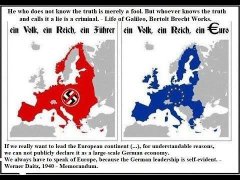Important Books
The most important book in the world?
"Providing a detailed historical analysis of the evolution of the Eurozone and its failings from the 1940s to the present day, the book argues that the Eurozone lacks the necessary monetary architecture, particularly the existence of a federal fiscal function which could have resolved the economic crisis quickly. The author examines the options available to Europe and concludes that an orderly abandonment of the euro and a return to national currencies is the superior option available." Eurozone Dystopia - Groupthink and Denial on a Grand Scale, 2015, William Mitchell
|
|
|
|
Neoliberal Politicians/Corporate Finance Run & Destroy EU - Greece, Italy for now... |
|
|
|
|
"The state nobility, which preaches the withering away of the state and the undivided reign of the market and the consumer, the commercial substitute for the citizen, has kidnapped the state: it has made the public good a private good, has made the 'public thing', res publica, the Republic, its own thing. (..) The national states are undermined from outside by these financial forces, and they are undermined from inside by those who act as the accomplices of these financial forces, in other words, the financiers, bankers and finance ministry officials. I think that the dominated groups in society have an interest in defending the state, particularly in its social aspect." -- Pierre Bourdieu, Acts of Resistance, 'Against the Destruction of a Civilization', 1998: 25
"The idea that the euro has "failed" is dangerously naive. The euro is doing exactly what its progenitor – and the wealthy 1%-ers who adopted it – predicted and planned for it to do. That progenitor is former University of Chicago economist Robert Mundell. The architect of "supply-side economics" is now a professor at Columbia University, but I knew him through his connection to my Chicago professor, Milton Friedman, back before Mundell's research on currencies and exchange rates had produced the blueprint for European monetary union and a common European currency.
"It's very hard to fire workers in Europe," he complained. His answer: the euro. - The euro would really do its work when crises hit, Mundell explained. Removing a government's control over currency would prevent nasty little elected officials from using Keynesian monetary and fiscal juice to pull a nation out of recession. "It puts monetary policy out of the reach of politicians," he said. " (And) without fiscal policy, the only way nations can keep jobs is by the competitive reduction of rules on business." He cited labor laws, environmental regulations and, of course, taxes. All would be flushed away by the euro. Democracy would not be allowed to interfere with the marketplace – or the plumbing.
As another Nobelist, Paul Krugman, notes, the creation of the eurozone violated the basic economic rule known as "optimum currency area". This was a rule devised by Bob Mundell. That doesn't bother Mundell. For him, the euro wasn't about turning Europe into a powerful, unified economic unit. It was about Reagan and Thatcher. "Ronald Reagan would not have been elected president without Mundell's influence," once wrote Jude Wanniski in the Wall Street Journal. The supply-side economics pioneered by Mundell became the theoretical template for Reaganomics – or as George Bush the Elder called it, "voodoo economics": the magical belief in free-market nostrums that also inspired the policies of Mrs Thatcher. Mundell explained to me that, in fact, the euro is of a piece with Reaganomics: "Monetary discipline forces fiscal discipline on the politicians as well." And when crises arise, economically disarmed nations have little to do but wipe away government regulations wholesale, privatize state industries en masse, slash taxes and send the European welfare state down the drain. - Thus, we see that (unelected) Prime Minister Mario Monti is demanding labor law "reform" in Italy to make it easier for employers like Mundell to fire those Tuscan plumbers. Mario Draghi, the (unelected) head of the European Central Bank, is calling for "structural reforms" – a euphemism for worker-crushing schemes. They cite the nebulous theory that this "internal devaluation" of each nation will make them all more competitive. Monti and Draghi cannot credibly explain how, if every country in the Continent cheapens its workforce, any can gain a competitive advantage [the well-known 'race to the bottom' destroying workers' standings]. But they don't have to explain their policies; they just have to let the markets go to work on each nation's bonds. Hence, currency union is class war by other means. (..) The flames, the mass unemployment, the fire-sale of national assets, would bring about what Friedman called a "regeneration" of Greece and, ultimately, the entire eurozone. So that Mundell and those others with villas can put their toilets wherever they damn well want to. - Far from failing, the euro, which was Mundell's baby, has succeeded probably beyond its progenitor's wildest dreams." Robert Mundell, evil genius of the euro, 2012, Greg Palast, The Guardian
"The euro has taken away the possibility for national governments to manage their economies in a meaningful way — and in Italy, just as in Greece a couple of years ago, the people have had to pay the true costs of its concomitant misguided austerity policies. - The unfolding of the repeated economic crises in euroland during the last decade has shown beyond any doubts that the euro is not only an economic project but just as much a political one. What the neoliberal revolution during the 1980s and 1990s didn’t manage to accomplish, the euro shall now force on us. But do the peoples of Europe really want to deprive themselves of economic autonomy, enforce lower wages and slash social welfare at the slightest sign of economic distress? Is increasing income inequality and a federal überstate really the stuff that our dreams are made of? I doubt it. History ought to act as a deterrent. During the 1930s our economies didn’t come out of the depression until the folly of that time — the gold standard — was thrown on the dustbin of history. The euro will hopefully soon join it. Economists have a tendency to get enthralled by their theories and model and forget that behind the figures and abstractions there is a real world with real people. Real people that have to pay dearly for fundamentally flawed doctrines and recommendations." Why the euro cannot be saved, June 2018, Lars Syll, (The) Swedish Professor of Economics
Wynne Godley's famous 1992 (sic!) article 'Maastricht and All That': "A lot of people throughout Europe have suddenly realised that they know hardly anything about the Maastricht Treaty while rightly sensing that it could make a huge difference to their lives. Their legitimate anxiety has provoked Jacques Delors to make a statement to the effect that the views of ordinary people should in future be more sensitively consulted. He might have thought of that before." Link, London Review of Books
"From the very start, the European Monetary Union (EMU) was set up to fail. - What we are witnessing today are the results of a design flaw. When individual nations like Greece or Italy joined the EMU, they essentially adopted a foreign currency—the euro—but retained responsibility for their nation’s fiscal policy. This attempted separation of fiscal policy from a sovereign currency is the fatal defect that is tearing the Eurozone apart." The Fundamental Design Flaw of the Eurozone, 2016, Alberto Botta and Marshall Auerbach
Some insights into the EU's practice and media 'coverage'
When the banks were 'bailed out' in Europe, the debt was 'nationalized', that is, put on the shoulders of the European populations. "50 billion euros in Greece, 70 Ireland, 40 Spain - one Euro-country after another is forced to support its banks with huge sums of money (..) from bad loans. But (..) Who are the beneficiaries?", The Secret Bank Bailout, 2013, Harald Schumann
95% of the loans given to Greece never went to Greece, but went to big banks in Germany, France, Britain etc., while Greece only received the loans as more debt. Moreover, these loans/debt btw. private banks and private borrowers were 'nationalized' and put on the shoulders of the Greek nation and people. Most of Greek bailout money went to banks: study, 2016, Deutche Welle
"Yves here. The European press and most of the rest of the world averts its eyes from the continued punitive, economically counterproductive austerity being inflicted on Greece. Be sure to read this interview in connection with Ambrose Evans-Pritchard’s story on the report by the IMF’s internal auditor. It lambasted the Fund for its conduct with European programs, most importantly, the one in Greece. The overview: The International Monetary Fund’s top staff misled their own board, made a series of calamitous misjudgments in Greece, became euphoric cheerleaders for the euro project, ignored warning signs of impending crisis, and collectively failed to grasp an elemental concept of currency theory." Yanis Varoufakis: Greece Was Never Bailed Out and Remains in Debtor’s Prison – Bild Zeitung Interview, 2018, Naked Capitalism
[2016] "For the progressives that tweeted and wrote to me over the last few days who claim that the “EU is not neo-liberal” in outlook, I wonder if they have read the relevant treaties that govern the EU and the attached protocols that drive the whole operations of the outfit. - The Stability and Growth Pact and the subsequent changes (two-pack, six-pack, fiscal compact) are all root-and-branch neo-liberal constructs. - These constructs dominate economic policy making within the EU (even if Britain was exempt from them). They are used to crucify Greece, and allow unemployment in Spain to persist above 20 per cent indefinitely, to name just a few examples." Why the Leave victory is a great outcome, 2016, Bill Mitchell
[2019] "My 2015 book – Eurozone Dystopia: Groupthink and Denial on a Grand Scale – was named to reflect the reality of the European Union. - No better demonstration of the validity of that title and the arguments presented need be produced than to refer everyone to the New Year’s Eve Tweet from the European Union Commission President Jean-Claude Juncker who was ‘celebrating’ 20 years of the common currency. Here is the Tweet (Dec. 31, 2018): “ As one of the only signatories of the Maastricht Treaty still politically active today, I remember the hard-fought and momentous negotiations on the launch of the Economic and Monetary Union. 20 years on, I am convinced that this was the most important signature I ever made. The euro has become a symbol of unity, sovereignty and stability. It has delivered prosperity and protection to our citizens and we must ensure that it continues to do so.” Some Brexit dynamics while across the Channel Europe is in denial, Jan. 2019, Bill Michell
"Even more importantly, Tooze marshals evidence from the memoirs of the then US Treasury Secretary, Timothy Geithner, to show that the German and French governments under Angela Merkel and Nicolas Sarkozy were seeking the help of the US administration to “unseat the Italian prime minister.” He concludes by quoting a German chancellery official as saying: “We do regime change better than the Americans”." Adam Tooze: Did They Really Save The Euro?, Oct. 2018, Social Europe
"I was reading John Maynard Keynes recently – circa 1928 – that is, 8 years before the publication of the General Theory with his Treatise on Money intervening. He was railing against the principles and practice of ‘sound finance’, which he noted had deliberately caused billions of pounds in lost income for the British economy. He urged the Treasury and the Bank of England to abandon their conservative (austerity) approach to the economy and, instead, embark on wide-scale fiscal stimulus to create jobs and prosperity. He concluded that with thousands of workers idling away in mass unemployment that it was “utterly imbecile to say that we cannot afford” to stimulate employment via large-scale public works – building infrastructure etc. He considered the policy makers who opposed such options were caught up in “the delirium of mental confusion”. The stark reality is that 88 years later, he could have written exactly the same article and would have been ‘right on the money’. We are being led (euphemism) by imbeciles." We are being led by imbeciles, 2016, Bill Mitchell
|
|
|
|
|
|
|
|
|
“Europe does not say what it does; it does not do what it says. It says what it does not do; it does what it doesn't say. Europe is an optical illusion.Pierre Bourdieu
Relat. HS Resource Pages
"Doesn’t it strike you as odd that, for more than five decades now, the U.S. government has been issuing and spending trillions of dollars of U.S. FIAT currency, and not once has a mainstream economist, journalist, or political leader found it worthy of consideration to even try to explain—from the perspective of what economic policy is all about—what a sovereign fiat currency actually is, and how it functions?" Money: The High Cost of Betrayal, 2018 by JD Alt
"So ask yourself this question: If the Federal Reserve can create trillions of dollars with a single keystroke, and the Fed is the government’s bank, then why does President Obama claim we’ve “run out” of money?" Where Did the Federal Reserve Get All that Money?, 2012, Stephanie Kelton - from HS: Modern Monetary Theory (MMT)
"The Nobel Factor tells how the prize, created by the Swedish central bank, emerged from a conflict between central bank orthodoxy and social democracy. The aim was to use the halo of the Nobel brand to enhance central bank authority and the prestige of market-friendly economics, in order to influence the future of Sweden and the rest of the developed world. And this strategy has worked, with sometimes disastrous results for societies striving to cope with the requirements of economic theory and deregulated markets."
Bill Mitchell on some of the Nobel Prize recipients: "I rank their work among the most distressing and obscene of all the disgraceful con jobs that the mainstream of my profession has deliberately foisted on the public policy process." Nobel prize – hardly noble, 2010 from HS: The Nobel Prize Hoax
Germany now controls the EU, while the media say: Germany pays to Greece
“Germany took over Europe with its Deutschmarks more easily than with its Panzer divisions.Sean Gervasi, former JFK advisor,
Brexit is a good idea
Plan A and B with MMT
Warren Mosler explains how a nation like Greece, Italy, France etc. can stay in the eurozone and re-create their own strong currency - which will make them able to create economic growth (2017): The EU - Plan A and Plan B with MMT
|


